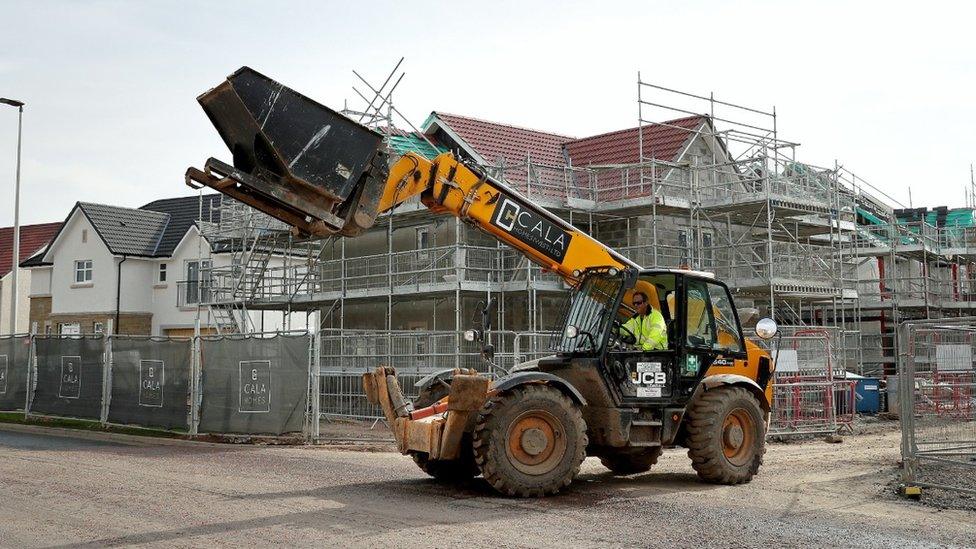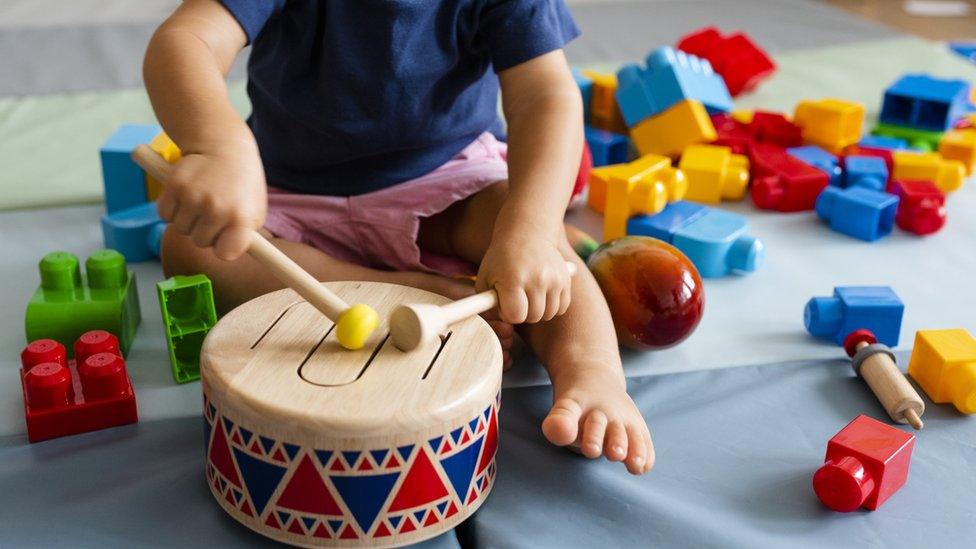Coronavirus: Who is allowed to go to work during 'lockdown'?
- Published
Employees should not be left to 'anguish' over working
The official advice is you should only travel to essential work if that cannot be done at home. What is classed as "essential work"?
First Minister Nicola Sturgeon told MSPs it was not possible to provide "bespoke guidance" for each business but she gave some examples and general principles.
1. It is employers who should make the decisions
"It should not be up to employees to anguish over whether they should be going into work," Ms Sturgeon said
If it is possible for a staff member to work from home, they should do so, she added.
But if staff cannot work from home, employers should ask themselves whether their business is "essential" to the fight against coronavirus.
That could include firms making medical supplies or essential items, or something essential to the wellbeing of the nation such as food supplies.
Such businesses are asked to keep going "if possible".
2. Non-essential shops should close
They are required to shut along with cafes, bars, restaurants, cinemas and gyms.
The UK government has issued a list of "essential" retailers which are allowed to stay open, external.
Supermarkets and pharmacies are among those on the list.
Is your business contributing something right now that is essential to the fight against coronavirus, for example making medical supplies or essential items, or something essential
3. Can they maintain safe-distancing between staff?
Ms Sturgeon said key strategic sites that cannot easily be shut down such as steel works could continue to work if they can maintain safe distancing between staff, and safe operating numbers
In other businesses, employers should also ask themselves whether they can operate in line with safe social distancing practice and normal health and safety. If they cannot answer yes, they should close.
4. Construction sites should close

This construction site at Larbert shut down on Tuesday
The first minister said building sites should close, unless it involves an essential building such as a hospital. Ms Sturgeon said this may be reviewed in future if safe rules can be put in place but in the meantime they should shut as a precaution.
5. What about gardeners or window cleaners?
People working alone, providing community services such as gardeners or window cleaners can continue to work.
"If they can go about their business safely this can be good for the community and we would encourage them to do so," said Ms Sturgeon.
What is the latest on helping key workers with childcare?

While the schools are closed, childcare will be provided by local authorities to families of some key workers.
However the Scottish government wants to keep the number of children taking up these places to an "absolute minimum".
In new guidance issued on key workers, external, the government asked employers:
to identify only staff "absolutely necessary" to deliver the Covid-19 response
consider introducing new shift patterns, working from home, recruiting more staff or dropping non-essential staff
discuss potential alternative childcare arrangements with employees, for example another parent who is not a key worker.
Deputy First Minister John Swinney said: "The priority [places] must be for children of the most critical key workers and for the most vulnerable children in our society."
"I would urge employers to look at the guidance and consider if there is any way they can provide their essential services in a way that enables children to stay at home."
Earlier guidance issued to councils set out a broad definition of "key workers", set out in three categories.
Category 1
Health and care workers directly supporting Covid response, and associated staff
Health and care workers supporting life threatening emergency work, as well as critical primary and community care provision
Energy suppliers and staff providing childcare/learning for other category 1 staff.
Category 2
All other health and care workers, and wider public sector workers providing emergency/critical welfare services (e.g Fire, Police, Prisons, Social Workers, etc),
Those supporting our critical national infrastructure, without whom serious damage to the welfare of the people of Scotland could be caused.
Category 3
All workers (private, public or third sector) without whom there could be a significant impact on Scotland (but where the response to Covid-19, or the ability to perform essential tasks to keep the country running, would not be severely compromised)
Some councils have published more detailed lists of "key workers" for childcare purposes.
North Lanarkshire Council,, external for example, says oil, gas, electricity and water and sewerage workers fall into category 2, while cemetery staff, waste management staff and payroll workers fall into category 3.

A SIMPLE GUIDE: What are the symptoms?
AVOIDING CONTACT: Should I self-isolate?
DO FACE MASKS WORK? Comparing different types
HOW DO I SELF-ISOLATE? What to do
WILL I GET PAID IF I SELF-ISOLATE? The rules on sick pay
